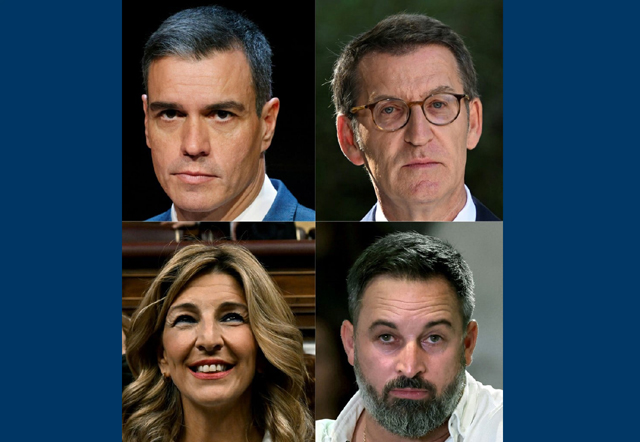
MADRID, July 22 (NNN-AGENCIES) — Spain votes Sunday in an early general election which polls suggest no party will win with enough votes to govern alone, making post-ballot alliances necessary.
Here are the main candidates vying for power:
– The incumbent PM: Written-off politically several times in the past, incumbent Socialist Prime Minister Pedro Sanchez, 51, has been in office since June 2018.
He took power after winning a no-confidence vote against a conservative Popular Party (PP) government with the support of other smaller leftist parties as well as Basque and Catalan separatist formations.
His government has passed a series of reforms such as legalising euthanasia and a law letting anyone 16 and over change their legally-registered gender based on a simple statement.
As Spain’s first premier to be fluent in English, the former economics professor has boosted the country’s influence in the European Union.
Known for risk-taking, he called the snap polls after his Socialists and their far-left coalition partner Podemos suffered a drubbing in regional and local elections in May.
– The conservative favourite: At the helm of Spain’s right-wing Popular Party (PP) for a year, Alberto Nunez Feijoo, 61, has steadied the party after one of the worst internal crises in its history.
He headed the regional government of his native Galicia in the rural northwest for 13 years, as well as the postal service and the former national health service. On his watch, the PP has consistently topped opinion polls.
Feijoo has pledged to reverse many of Sanchez’s laws, including one seeking to tackle the legacy of the 1939-1975 dictatorship of Francisco Franco.
He has also accused Sanchez of betraying Spain by relying on the support of Basque and Catalan separatist parties to pass laws, and for pardoning Catalan leaders serving jail terms over a botched 2017 secession bid.
A moderate, Feijoo has nonetheless not ruled out an alliance with far-right Vox to govern if the PP wins the most seats but falls short of a working majority, as most polls suggest.
The PP and Vox have already reached such an agreement in several regions and municipalities after May’s elections despite Vox’s ultra-conservative stances on social issues.
– The popular Communist: Labour Minister Yolanda Diaz — a member of the Spanish Communist Party (PCE) — managed to attract the support of 15 small leftist parties, including Podemos, to create a new movement called Sumar which she leads.
Largely unknown when she became labour minister in 2020, this 52-year-old lawyer with an affable character has become Spain’s most trusted party leader according to polls.
She negotiated a crucial furlough agreement during the Covid crisis, secured a significant increase to the minimum wage and pushed through a key labour reform which limits the use of temporary contracts.
Sumar, which hopes to govern with Sanchez’s Socialists, has put forward a far-left programme.
One of its central measures is a “universal inheritance” plan, which involves giving young people 20,000 euros ($22,500) to spend on study or training.
– The ultranationalist: A PP member since his teens, Santiago Abascal cut ties with the party in late 2013 to help found the far-right Vox which he has since led.
Built like a pitbull with an impeccably trimmed beard, the 47-year-old is known for his populist rhetoric and hardline stance on Catalan separatism, which has helped turn Vox into a potential kingmaker.
Vox’s popularity soared following Catalonia’s failed 2017 secession bid, and it became the third-biggest party in parliament after the last general election in 2019.
Vox is openly anti-abortion and opposes LGBTQ rights; it rejects the need for the government to combat gender violence, is a vocal critic of “climate fanaticism” and wants to cut benefits for migrants.
Abascal has cultivated strong ties with other European far-right parties from Hungary’s ruling Fidesz to the Brothers of Italy of Italian Prime Minister Giorgia Meloni. — NNN-AGENCIES





